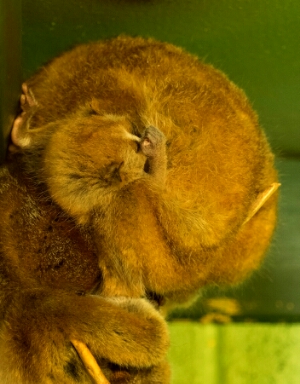A pygmy slow loris born at Paignton Zoo in March is becoming easier for visitors to spot. The single youngster was born on 8th March to an experienced breeding pair with the less-than-exotic names 8504 (that’s Dad) and 8605 (Mum).
It’s thought that the name loris may come from an old Dutch word for clown. The animals have a comical and endearing appearance which has led to them becoming victims of the illegal pet trade, though their toxic bite and strong odour make them very bad to have around the house.
There is a European Endangered species Programme for pygmy slow loris. An EEP is the most intensive type of population management, and includes data collection, a studbook, demographic and genetic analysis and plans for the future management of the species.
Paignton Zoo has a larger than average collection of pygmy slow loris, with a total of 7 animals at present. The un-named and as yet unsexed baby weighed around 25/30 grams when born.
The pygmy slow loris (Nycticebus pygmaeus) is classified as Vulnerable by the IUCN Red List, which means that it is considered to be facing a high risk of extinction in the wild. This small nocturnal primate comes from the forests of South East Asia, where it lives on a diet of insects, fruit, slugs and snails.
The Vietnam War nearly wiped out this species of loris as forests were burned or defoliated. The destruction of forests continues today due to agriculture and development. The pet trade is another serious threat. Paignton Zoo Environmental Park is a registered charity. For more information go towww.paigntonzoo.org.uk or ring 01803 697500.



























